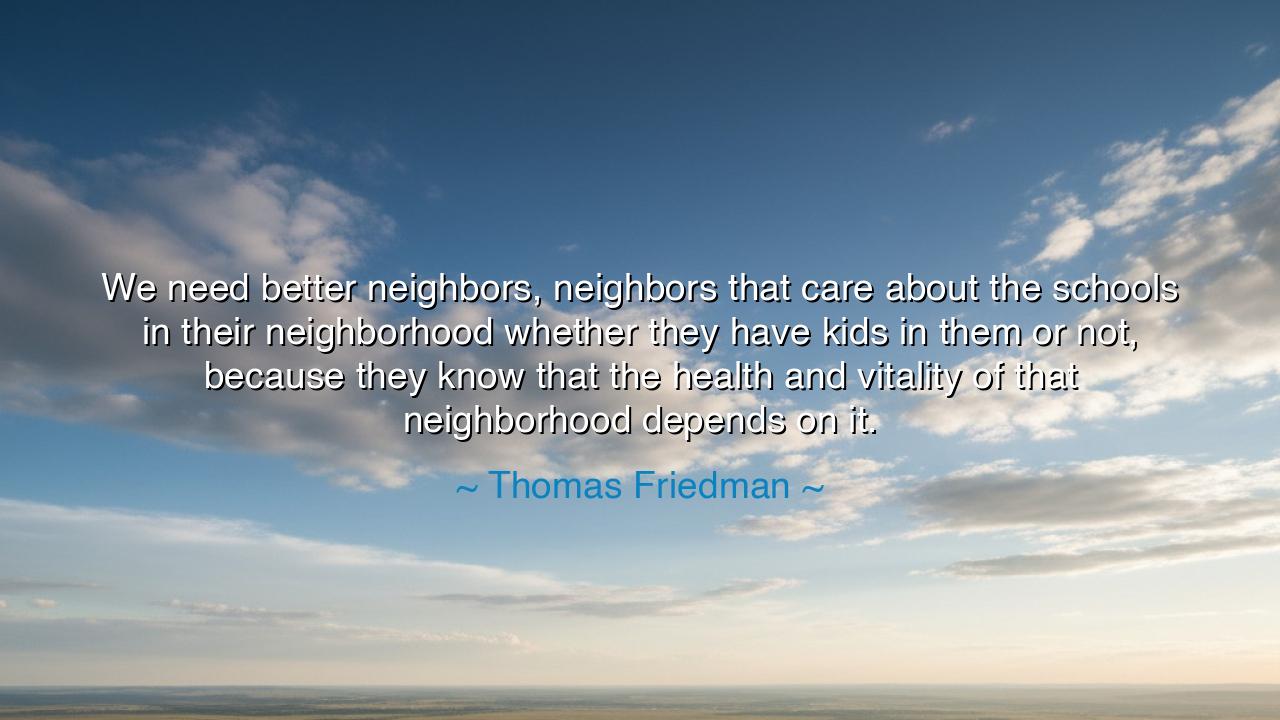
We need better neighbors, neighbors that care about the schools
We need better neighbors, neighbors that care about the schools in their neighborhood whether they have kids in them or not, because they know that the health and vitality of that neighborhood depends on it.






The words of Thomas Friedman — “We need better neighbors, neighbors that care about the schools in their neighborhood whether they have kids in them or not, because they know that the health and vitality of that neighborhood depends on it.” — shine with the wisdom of shared responsibility, a principle as old as civilization itself. Beneath these modern words lies an ancient truth: that the strength of a community is not measured by the comfort of the few, but by the welfare of the whole. Friedman speaks not merely of schools and education, but of the sacred bond that ties neighbor to neighbor, generation to generation.
In the old days, before cities of steel and glass divided men into private kingdoms, people lived with a deeper sense of interdependence. The farmer’s harvest fed the blacksmith’s family, the blacksmith’s work armed the shepherd against wolves, and all together they built walls, temples, and traditions that endured. Each man and woman knew: if one corner of the village weakens, the whole structure trembles. So too, Friedman reminds us that the health of our communities rests on how deeply we care for one another — especially for the young, whose futures shape our own.
To care about the schools in one’s neighborhood, even without children of one’s own, is to act with foresight and compassion. The ancients called this civic virtue — the willingness to serve not for personal gain but for the good of all. A school is not merely a place of learning; it is the beating heart of the neighborhood, a forge where minds are shaped, values taught, and hope renewed. When a community allows its schools to decay, it is not only failing its children — it is abandoning its future. Education is the soil from which all prosperity grows, and a barren soil can bear no fruit for any man.
Consider the example of Horace Mann, the 19th-century reformer who fought to make education free and universal in America. He believed that schools were “the great equalizer,” lifting society by lifting its citizens. He faced critics who claimed that those without children should not pay taxes for schools, yet Mann replied with a truth that mirrors Friedman’s: that every person benefits from an educated populace — for ignorance breeds crime, division, and decay. A wise neighbor knows that the child next door, well-taught and well-guided, is the guardian of tomorrow’s peace.
But Friedman’s words also hold warning. In an age of isolation, where walls grow higher and hearts grow colder, the spirit of neighborly care withers. People retreat into private lives, believing that their success is their own making, untouched by the fate of others. Yet history shows the folly of such thinking. The decline of ancient Athens began when its citizens forgot their duty to the common good. Once the city of philosophers and heroes, it fell to selfishness and apathy — proof that when citizens cease to act as neighbors, a nation dies not by war, but by neglect.
Thus, Friedman’s plea is both moral and practical. He calls for better neighbors — not richer, not more powerful, but more mindful and compassionate. To care for the schools, the parks, the health of one’s street, is to sow the seeds of resilience. It is to understand that what blesses one corner of the community blesses all, and what poisons one part eventually reaches the rest. This is the wisdom of interconnection, the harmony that sustains all societies, ancient and modern alike.
So, my children of the present age, take this lesson to heart. Do not live as islands, but as part of a greater whole. Walk your neighborhoods, know your neighbors, and lend your strength to the places where young minds grow. Support the schools not as distant institutions, but as the sacred hearth of your collective future. For the fate of a single classroom can echo through a thousand homes, and the health of a community is written not in its wealth, but in its unity.
In the end, Friedman’s words are not just a call to action but a reminder of belonging: that the true measure of civilization is how well its people care for those who cannot yet care for themselves. To be a good neighbor is to be a custodian of the future — and in that sacred duty, every soul finds both purpose and peace.






AAdministratorAdministrator
Welcome, honored guests. Please leave a comment, we will respond soon